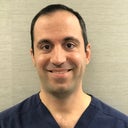Thank you for your question. You submitted a photo, and say you hate your prominent eyes, and read about a procedure called orbital decompression. You state you have minus ten myopia, and ask what can be done to improve the appearance of your eyes.


